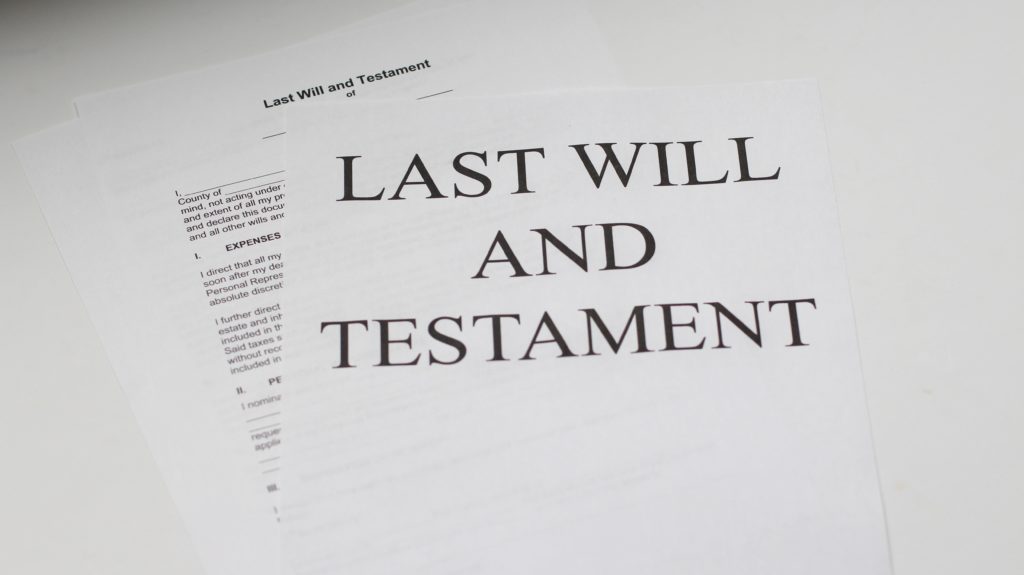By Evan Rogdakis and Matthew McCarthy

When a person dies without a Last Will and Testament, the person is said to have died intestate, and the State where they lived provides the distribution schedule regardless of what the decedent’s wants, wishes, or desires may be. When someone dies without a Will in New York those assets which are controlled by deed or beneficiary status will flow accordingly, but anything else will be distributed as follows:
- If the person was married with children, the widowed spouse and children are entitled to $50,000 and one-half of the assets with the balance remaining distributed to the children
- If the person was married with no children, the widowed spouse is entitled to the entirety of the estate.
- If the person has children and no surviving spouse, the children are entitled to the entirety of the estate
- If the person was not married, did not have children, but is survived by their parents, the surviving parent or parents is entitled to the entirety of the estate.
- If the person was not married, did not have children, was not survived by any parent or parents, but is survived by any sibling or siblings, that sibling or siblings is entitled to the estate
- If the person was not married, did not have children, was not survived by any parent or parents, was not survived by any sibling or siblings, but is survived by any grandparent or grandparents, the surviving grand parent or grandparents is entitled to the estate by representation.
- If the person was not married, did not have any children, was not survived by any parent or parents, was not survived by any sibling or siblings, was not survived by any grandparent or grandparents, but is survived by any great-grandparent or great-grandparents, the surviving great-grandparents or great-grandparents is entitled to the estate.
In addition to the distribution schedule described above, a properly drafted estate plan can provide for very common scenarios such as:
- For a surviving spouse who may not have the ability to continue the family’s business.
- For surviving children, depending on their age and/or financial knowledge, so the money can provide opportunities, or it may be a hindrance.
- For the nomination of who a parent would like to be guardian of their minor child, which, beyond assets, is one of the most important things an estate plan can provide for
- For children and other family members with Special Needs, which is particularly important to plan for as not to interfere with their government benefits.
We at KI Legal recommend the preparation of an estate plan that is based on a Last Will and Testament that is tailored to the family and their testamentary intent. By writing a will, you have the power to pick your own executor or executors to manage your estate, waive the requirement of imposing a bond, and controlling who gets your assets. At KI Legal, we can help you understand what happens when a person dies intestate and why it is more beneficial to draft a Last Will and Testament.
To speak with one of our experienced estate lawyers about your family situation, contact KI Legal at (646) 766-8308.
This information is the most up to date news available as of the date posted. Please be advised that any information posted on the KI Legal Blog or Social Channels is being supplied for informational purposes only and is subject to change at any time. For more information, and clarity surrounding your individual organization or current situation, contact a member of the KI Legal team.
_____________________________________________________________________________________________
KI Legal focuses on guiding companies and businesses throughout the entire legal spectrum. KI Legal’s services generally fall under three broad-based practice group areas: Transactions, Litigation and General Counsel. Its extensive client base is primarily made up of real estate developers, managers, owners and operators, lending institutions, restaurant and hospitality groups, construction companies, investment funds, and asset management firms. KI Legal’s unwavering reputation for diligent and thoughtful representation has been established and sustained by its strong team of reputable attorneys and staff. For the latest updates, follow KI Legal on LinkedIn, Facebook, and Instagram. For more information, visit kilegal.com.
The post What Happens When a Person Dies Without a Last Will and Testament? appeared first on KI Legal.
